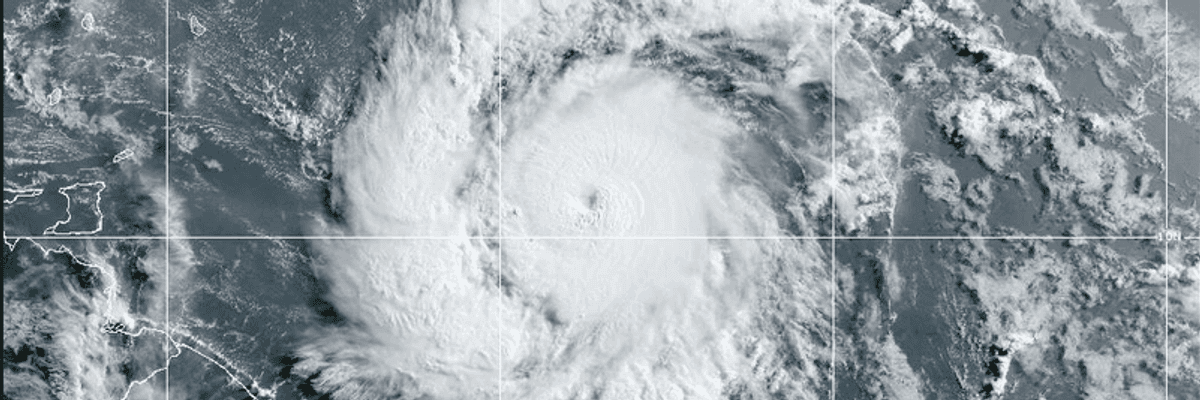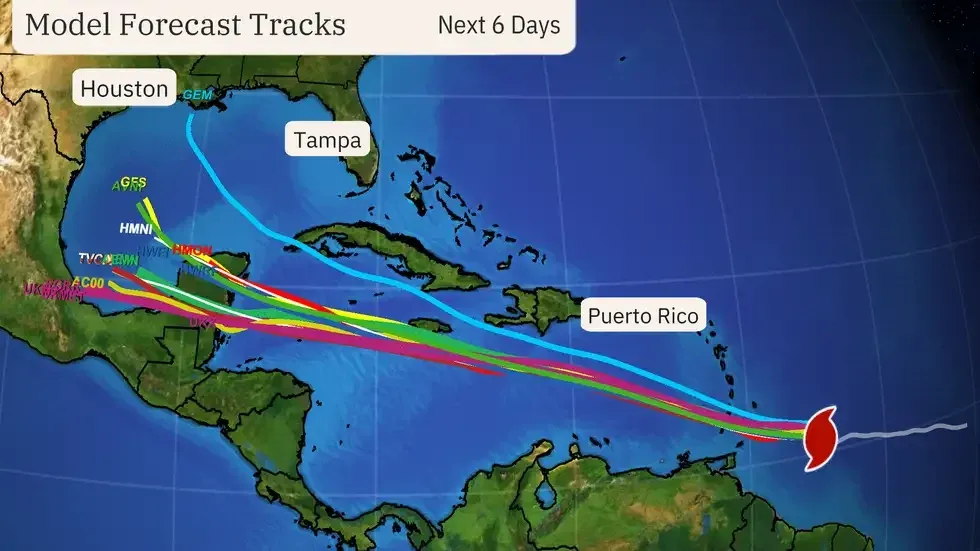

SUBSCRIBE TO OUR FREE NEWSLETTER
Daily news & progressive opinion—funded by the people, not the corporations—delivered straight to your inbox.
5
#000000
#FFFFFF
To donate by check, phone, or other method, see our More Ways to Give page.


Daily news & progressive opinion—funded by the people, not the corporations—delivered straight to your inbox.

A satellite image of Hurricane Beryl as churns toward the southeast Caribbean on Sunday, June 20, 2024.
"The climate crisis is here. This is an emergency. Politicians need to start acting like it."
Meteorologists, climate campaigners, and extreme weather experts expressed shock and horror Sunday as Hurricane Beryl exploded into an "extremely dangerous" Category 4 storm as it headed into the warm waters of the southern Caribbean with a level of intensification characterized as unprecedented.
The National Hurricane Center on Sunday morning called it a "very dangerous situation" due to "potentially catastrophic hurricane-force winds, a life-threatening storm surge, and damaging waves" for the numerous mainland and island nations in Beryl's path.
According to the NHC, the Windward Islands of St. Vincent, the Grenadines, and Granada will be the first at highest risk from the storm as well as St. Lucia and Barbados. People on those islands and elsewhere in the region were told that all preparations for the storm "should be rushed to completion" without delay.
Weather Underground reports that subsequent locations that may face Beryl's wrath later this week could be Jamaica, the Cayman Islands, Belize and Mexico's Yucatan Peninsula, though noted "there's uncertainty in that exact track" of the hurricane as detailed in the following graphic:

Citing records going back to 1851, the Washington Post reported Sunday that there "is no precedent for a storm to intensify this quickly, nor reach this strength, in this part of the ocean during the month of June."
Eric Blake, a hurricane expert, said that Beryl on Sunday was "rewriting the history books in all the wrong ways," as he urged people in its path to "be very safe and take this hurricane seriously" as "very few will have experienced a hurricane this strong" on those islands.
"This is unreal," said Nahel Belgherze, a journalist focused on extreme weather. "Hurricane Beryl continues to defy all known logic, now becoming the first June Category 4 hurricane ever recorded in the Atlantic Basin. I can't even stress enough just how completely absurd that storm is."
"The climate crisis is here," said the Sunrise Movement in a social media post showing the extreme power and historic nature of Hurricane Beryl. "This is an emergency. Politicians need to start acting like it."
The group took the opportunity to re-share its petition calling on President Joe Biden to "declare a climate emergency" as a way to unlock federal funds and escalate the government's response to the crisis of fossil fuels that are the main driving of surging global temperatures.
In May, the U.S. National Oceanic and Atmospheric Administration (NOAA) predicted that the 2024 hurricane season—which officially runs from June 1 to the end of November—would be "extraordinary" and "above-normal," largely due to rising ocean temperatures attributable to human-caused global warming couple with La Niña conditions.
Dear Common Dreams reader, The U.S. is on a fast track to authoritarianism like nothing I've ever seen. Meanwhile, corporate news outlets are utterly capitulating to Trump, twisting their coverage to avoid drawing his ire while lining up to stuff cash in his pockets. That's why I believe that Common Dreams is doing the best and most consequential reporting that we've ever done. Our small but mighty team is a progressive reporting powerhouse, covering the news every day that the corporate media never will. Our mission has always been simple: To inform. To inspire. And to ignite change for the common good. Now here's the key piece that I want all our readers to understand: None of this would be possible without your financial support. That's not just some fundraising cliche. It's the absolute and literal truth. We don't accept corporate advertising and never will. We don't have a paywall because we don't think people should be blocked from critical news based on their ability to pay. Everything we do is funded by the donations of readers like you. Will you donate now to help power the nonprofit, independent reporting of Common Dreams? Thank you for being a vital member of our community. Together, we can keep independent journalism alive when it’s needed most. - Craig Brown, Co-founder |
Meteorologists, climate campaigners, and extreme weather experts expressed shock and horror Sunday as Hurricane Beryl exploded into an "extremely dangerous" Category 4 storm as it headed into the warm waters of the southern Caribbean with a level of intensification characterized as unprecedented.
The National Hurricane Center on Sunday morning called it a "very dangerous situation" due to "potentially catastrophic hurricane-force winds, a life-threatening storm surge, and damaging waves" for the numerous mainland and island nations in Beryl's path.
According to the NHC, the Windward Islands of St. Vincent, the Grenadines, and Granada will be the first at highest risk from the storm as well as St. Lucia and Barbados. People on those islands and elsewhere in the region were told that all preparations for the storm "should be rushed to completion" without delay.
Weather Underground reports that subsequent locations that may face Beryl's wrath later this week could be Jamaica, the Cayman Islands, Belize and Mexico's Yucatan Peninsula, though noted "there's uncertainty in that exact track" of the hurricane as detailed in the following graphic:

Citing records going back to 1851, the Washington Post reported Sunday that there "is no precedent for a storm to intensify this quickly, nor reach this strength, in this part of the ocean during the month of June."
Eric Blake, a hurricane expert, said that Beryl on Sunday was "rewriting the history books in all the wrong ways," as he urged people in its path to "be very safe and take this hurricane seriously" as "very few will have experienced a hurricane this strong" on those islands.
"This is unreal," said Nahel Belgherze, a journalist focused on extreme weather. "Hurricane Beryl continues to defy all known logic, now becoming the first June Category 4 hurricane ever recorded in the Atlantic Basin. I can't even stress enough just how completely absurd that storm is."
"The climate crisis is here," said the Sunrise Movement in a social media post showing the extreme power and historic nature of Hurricane Beryl. "This is an emergency. Politicians need to start acting like it."
The group took the opportunity to re-share its petition calling on President Joe Biden to "declare a climate emergency" as a way to unlock federal funds and escalate the government's response to the crisis of fossil fuels that are the main driving of surging global temperatures.
In May, the U.S. National Oceanic and Atmospheric Administration (NOAA) predicted that the 2024 hurricane season—which officially runs from June 1 to the end of November—would be "extraordinary" and "above-normal," largely due to rising ocean temperatures attributable to human-caused global warming couple with La Niña conditions.
Meteorologists, climate campaigners, and extreme weather experts expressed shock and horror Sunday as Hurricane Beryl exploded into an "extremely dangerous" Category 4 storm as it headed into the warm waters of the southern Caribbean with a level of intensification characterized as unprecedented.
The National Hurricane Center on Sunday morning called it a "very dangerous situation" due to "potentially catastrophic hurricane-force winds, a life-threatening storm surge, and damaging waves" for the numerous mainland and island nations in Beryl's path.
According to the NHC, the Windward Islands of St. Vincent, the Grenadines, and Granada will be the first at highest risk from the storm as well as St. Lucia and Barbados. People on those islands and elsewhere in the region were told that all preparations for the storm "should be rushed to completion" without delay.
Weather Underground reports that subsequent locations that may face Beryl's wrath later this week could be Jamaica, the Cayman Islands, Belize and Mexico's Yucatan Peninsula, though noted "there's uncertainty in that exact track" of the hurricane as detailed in the following graphic:

Citing records going back to 1851, the Washington Post reported Sunday that there "is no precedent for a storm to intensify this quickly, nor reach this strength, in this part of the ocean during the month of June."
Eric Blake, a hurricane expert, said that Beryl on Sunday was "rewriting the history books in all the wrong ways," as he urged people in its path to "be very safe and take this hurricane seriously" as "very few will have experienced a hurricane this strong" on those islands.
"This is unreal," said Nahel Belgherze, a journalist focused on extreme weather. "Hurricane Beryl continues to defy all known logic, now becoming the first June Category 4 hurricane ever recorded in the Atlantic Basin. I can't even stress enough just how completely absurd that storm is."
"The climate crisis is here," said the Sunrise Movement in a social media post showing the extreme power and historic nature of Hurricane Beryl. "This is an emergency. Politicians need to start acting like it."
The group took the opportunity to re-share its petition calling on President Joe Biden to "declare a climate emergency" as a way to unlock federal funds and escalate the government's response to the crisis of fossil fuels that are the main driving of surging global temperatures.
In May, the U.S. National Oceanic and Atmospheric Administration (NOAA) predicted that the 2024 hurricane season—which officially runs from June 1 to the end of November—would be "extraordinary" and "above-normal," largely due to rising ocean temperatures attributable to human-caused global warming couple with La Niña conditions.